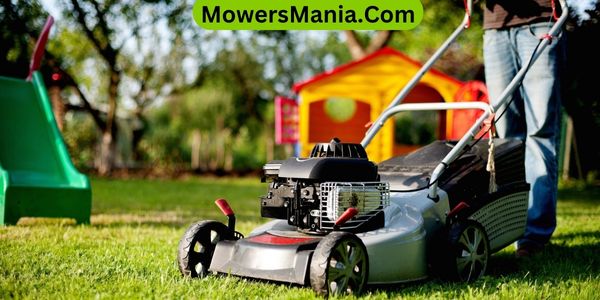Having trouble getting your lawn mower started?
If your mower won’t kick into gear, there could be a few common culprits to blame.
From spark plug issues to fuel system problems, we’ll walk you through the top reasons why your trusty mower might be giving you a hard time.

Keep reading to uncover the simple solutions to get your lawn mower up and running again.
Spark Plug Issues
If your lawn mower won’t start, check the spark plug for signs of wear or fouling. A worn or fouled spark plug is a common culprit for a mower failing to start.
To inspect the spark plug, start by disconnecting the spark plug wire and removing the plug with a spark plug socket. Look for any signs of wear, such as a damaged electrode or insulator.
Additionally, if the spark plug appears to be covered in black soot or oil, it may be fouled and in need of cleaning or replacement.
To clean a fouled spark plug, use a wire brush and some solvent to carefully remove any built-up deposits. However, if the spark plug is heavily fouled or damaged, it’s best to replace it with a new one.
When installing a new spark plug, be sure to check the manufacturer’s specifications for the correct gap setting to ensure optimal performance. Once the new spark plug is in place, reconnect the spark plug wire and try starting the mower again.
Fuel System Problems
When troubleshooting why your lawn mower won’t start, a common issue to consider after checking the spark plug is potential fuel system problems.
The fuel system is essential for delivering the correct fuel-air mixture to the engine for combustion. If there’s an issue within the fuel system, it can prevent your lawn mower from starting.
Here are some potential fuel system problems to look out for:
- Clogged Fuel Filter: A clogged fuel filter can restrict the flow of fuel to the engine, leading to starting issues. Over time, the fuel filter can become clogged with dirt, debris, and old fuel, causing a disruption in the fuel supply.
- Old or Stale Fuel: Using old or stale fuel can lead to starting problems. Fuel that has been sitting in the tank for an extended period can break down and become less effective, making it difficult for the engine to start.
- Fuel Line Issues: Check the fuel lines for any cracks, leaks, or blockages. Damaged or clogged fuel lines can disrupt the flow of fuel to the engine, resulting in starting issues. Regularly inspect and replace any damaged fuel lines to ensure proper fuel delivery.
Air Filter Blockage

After addressing potential fuel system problems, another issue to consider for why your lawn mower won’t start is air filter blockage, which can restrict the airflow necessary for proper engine combustion.
If your air filter is clogged with dirt, grass clippings, or other debris, it can limit the amount of air reaching the engine. This restricted airflow disrupts the air-fuel mixture, preventing the engine from starting.
To address this, locate the air filter housing, typically located on the side or top of the engine, and inspect the filter. If it appears dirty or clogged, remove and clean it according to the manufacturer’s instructions. If the filter is old and worn out, it may be best to replace it with a new one.
Regularly maintaining and replacing the air filter as needed will ensure proper airflow and combustion, keeping your lawn mower starting smoothly.
By addressing air filter blockage, you can eliminate it as a potential reason for your lawn mower’s starting issues, allowing you to move on to other troubleshooting steps if necessary.
Ignition Coil Malfunction
Check the ignition coil for signs of wear or damage. The ignition coil is a crucial component of your lawn mower’s starting system. If it malfunctions, your mower won’t start.
Here are some potential issues to look out for:
- Cracks or Physical Damage: Inspect the ignition coil for any visible cracks or physical damage. These can disrupt the flow of electricity and prevent the spark plug from firing.
- Rust or Corrosion: Look for any signs of rust or corrosion on the ignition coil. This can interfere with the coil’s ability to generate the necessary electrical current for starting the engine.
- Faulty Wiring Connections: Check the wiring connections to the ignition coil. Loose or damaged connections can impede the flow of electricity and lead to starting problems.
If you notice any of these issues during your inspection, it may be necessary to replace the ignition coil to restore proper starting functionality to your lawn mower.
Keep in mind that proper maintenance and periodic inspections can help prevent ignition coil malfunctions and keep your lawn mower running smoothly.
Carburetor Troubles

If your lawn mower won’t start, a common culprit could be a clogged or dirty carburetor. The carburetor plays a crucial role in the combustion process by mixing air and fuel in the right proportions. When it becomes clogged or dirty, it can disrupt this mixture, leading to starting issues.
Here are some signs that your lawn mower’s carburetor may be causing trouble:
| Signs of Carburetor Troubles | Solutions |
|---|---|
| Engine not starting | Clean or replace the carburetor to remove any blockages or build-up. |
| Rough idling or stalling | Adjust the carburetor settings or clean the carburetor to ensure proper fuel and air mixture. |
| Black smoke from the exhaust | Clean or replace the carburetor to address the rich fuel mixture caused by a clog. |
| Fuel leaking from the carburetor | Inspect the carburetor for any damage or wear, and replace any faulty components. |
Regular maintenance and cleaning of the carburetor can prevent these issues and keep your lawn mower running smoothly. If you’re experiencing any of these problems, addressing the carburetor could be the key to getting your lawn mower up and running again.
Frequently Asked Questions [FAQs]
Can Using Old or Stale Fuel Cause My Lawn Mower to Not Start?
Using old or stale fuel can cause your lawn mower not to start. It can clog the fuel system and prevent the engine from running smoothly. Consider draining old fuel and using fresh gasoline for optimal performance.
How Often Should I Clean or Replace the Spark Plug in My Lawn Mower?
You should clean or replace the spark plug in your lawn mower at least once a year. This will ensure proper ignition and efficient performance. Neglecting this maintenance can lead to starting issues and poor engine operation.
What Are Some Signs That My Lawn Mower’s Air Filter May Be Clogged?
If your lawn mower’s air filter is clogged, you might notice reduced power, black smoke from the exhaust, or difficulty starting. Regularly check and clean or replace the air filter to ensure your mower runs smoothly.
How Can I Tell if the Ignition Coil in My Lawn Mower Is Malfunctioning?
If your lawn mower won’t start, check for a malfunctioning ignition coil. Signs of a faulty coil include the engine not starting, stalling, or running poorly. A spark tester can help diagnose the issue.
Are There Any Maintenance Tips to Prevent Carburetor Troubles in My Lawn Mower?
To prevent carburetor troubles in your lawn mower, regularly clean and maintain it. Use a fuel stabilizer, avoid old or contaminated fuel, and store the mower properly. Following these tips can help prevent issues.
Conclusion
So, if your lawn mower won’t start, don’t panic.
Check the spark plug, fuel system, air filter, ignition coil, and carburetor for any issues.
These are the most common reasons why your lawn mower may not start.
With a little troubleshooting and maintenance, you can get your lawn mower up and running again in no time.



